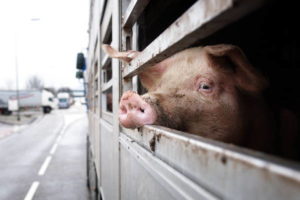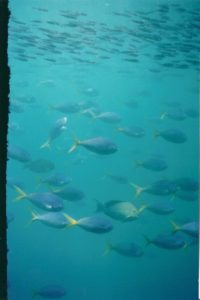Worldlog 17 de abril 2017
“Enquanto houver matadouros, haverá campos de batalha.” Um comentário histórico de Tolstoi, escritor russo, filósofo e pensador político. Ao mesmo tempo, ainda uma frase bem oportuna. No final de março tornaram se publicas filmagem secretas muito conflituosa da organização bem-estar animal Animal Rights, mostrando como um matadouro em Tielt na Bélgica viola estruturalmente praticamente todas as regras de bem-estar animal e segurança alimentar.
Chocante, mas não surpreendente. Sabendo que são abatidos 650 porcos a cada hora na Holanda e auditores têm menos de cinco segundos para aprovar um porco também são preocupações sobre o tratamento dos animais nos matadouros holandeses. É por isso que pedimos no Parlamento um controle de câmeras obrigatório nos matadouros. E com sucesso! Nossa proposta foi adotado por uma grande maioria. Um passo importante para uma maior transparência. Para que a indústria leve a sério o bem-estar animal e os consumidores olhem conscientemente para a carne no prato. Falamos com as palavras de Paul McCartney: “Se matadouros tivessem paredes de vidro, todos seriam vegetarianos.”

Relatórios chocantes chegaram sobre o nosso mundo subaquático. O coral no Caribe ameaça desaparecer no prazo de quinze anos e também grandes partes da Grande Barreira de Corais Australiana foram afetadas devido ao aquecimento da água do mar. Para salvar o coral temos que todos juntos significativamente jogar menos CO2 no mundo. Na Europa, muitos países felizmente conseguiram chegar a baixos níveis de emissões. Como uma ação positiva Grã-Bretanha, alcançou uma redução de 30 por cento, em parte devido à entrada de preços de CO2. Uma ferramenta eficaz que o Partido para os Animais também defende.
No entanto, o declínio na Europa ainda tem de acontecer duas vezes mais forte para alcançar as metas de Paris. E na Holanda – onde as emissões de CO2 subiu para o maior nível de sempre! – ainda tem grandes passos a caminhar.

Passos que só podem ser colocados se o governos abandonar o mantra destrutivo do crescimento, crescimento, crescimento. E fizer a mudança para um sistema econômico baseado na capacidade de carga da Terra e da sociedade. Um sistema em que somos mais do que apenas funcionários, consumidores e proprietários de capital. Kate Raworth do Environmental Change Institute da Universidade de Oxford concebeu um novo modelo econômico: The Donut. Leia aqui este artigo interessante sobre isso.
Ótimos resultados nas eleições municipais da Finlândia. Muitos votos conseguidos. Infelizmente, não foi o suficiente para ganhar um assento de aconselhador em um dos seis municípios participantes. Mas como nosso partido irmão finlandês indicou “Com uma pequena equipe e um pequeno orçamento estamos muito felizes com o resultado.”
Até logo. Atenciosamente,
Marianne
‘As long as there are slaughterhouses there will always be battlefields.’ A historic quote by Tolstoj, the Russian writer, philosopher and political thinker. At the same time, it is still a topical quote. At the end of March, some highly confronting undercover images taken by the animal welfare organisation Animal Rights were published, which showed that almost all rules and regulations for animal welfare and food safety were structurally violated in a slaughterhouse in Tielt in Belgium.
Shocking, but not surprising. Knowing that 650 pigs are slaughtered every hour in the Netherlands and that inspectors get not even five seconds to check a pig causes also great concern about the treatment of animals in Dutch slaughterhouses. That is why we made a plea in the Lower House for mandatory CCTV in slaughterhouses. And we did so successfully. Our motion was adopted by a great majority. An important step towards more transparency, thus forcing the industry to take animal welfare more seriously and the consumer to be more conscious of the meat on his or her plate. And to quote Sir Paul McCartney: ‘If slaughterhouses had glass walls, everyone would be a vegetarian’.

There were shocking messages concerning our underwater world. The corals in the Caribbean are threatened to vanish within fifteen years and large parts of the Australian Great Barrier Reef are affected by severe bleaching due to the warming of seawater. To save the corals, we should all immediately reduce the emission of greenhouse gases into the atmosphere. Fortunately, many countries in Europe reduced their emissions considerably already. With Great Britain as a positive peak, which reached a reduction of 30 per cent, partly due to the introduction of its CO2 prices. An efficient instrument which is advocated by the Party for the Animals too.
Yet, greenhouses gases in Europe must be reduced twice as fast to meet the Paris climate goals. And the Netherlands – where the emission of greenhouse gases increased to the highest level ever! – still has to make great efforts.

Efforts that can only be achieved if the governments set aside their destructive mantra of growth, growth, growth. And change to an economic system that is based on the capacity of the earth and society. A system where we are more than just employees, consumers and owners of capital. Kate Raworth of Oxford University’s Environmental Change Institute thought up such new economic model: The Doughnut. Read here the interesting article about it.
Great results at the municipal elections in Finland. Many votes obtained. But unfortunately just not enough to obtain a municipal council seat in one of the six participating municipalities. But as our Finnish sister party pointed out ‘A great result with a small team and a small budget.’
Until soon. Kind regards,
Marianne